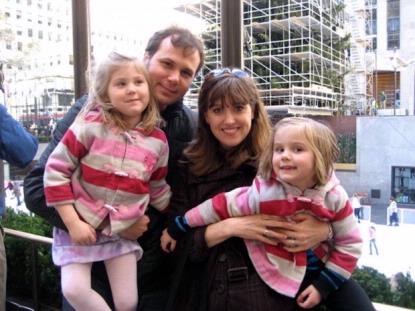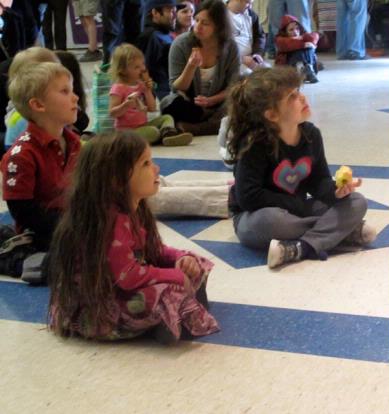The one piece of twin advice I ever sought out—not for myself—turns out, I’m told, to be very good advice indeed: prepare to spend the early nursing months shirtless. Make sure that you have comfortable “stations” ready for the task around the house with water and reading material, phone, snack or whatever else at the ready, because once you plonk down and plug in, you can’t move easily.
Jane Roper chronicles her first three years as mom to twins in her memoir Double Time—and she talks about twins and nursing, too. Short version, she didn’t like to tandem nurse, because the coziness of that moment was overtaken by the logistics of juggling her two girls in two arms on two breasts. Nursing one baby at a time allowed her some Clio bonding and some Elsa bonding—and she felt less tangled to boot. So not all twins or moms of twins are alike! As my four year-old would say, “Duh!”
There is some great advice for parents of twins here and I can see that any parents-to-be of twins may/should get a copy at the doubly overwhelming baby shower (maybe even two copies?). And any parent of singletons will read about the sleep training success of seven-to-seven sleepers with envy, as the author predicts, sure (that’d be me, duh!).

An assured storyteller—on Jane’s blog on Babble, Baby Squared, she’s shared about life with her twin daughters since the girls were infants—there’s a chance for both fellow twin parents and others to glimpse the grocery store with twins or toddler play date with twins or road trip preparations. Her experiences with depression, though, pre-parenthood, post-weaning, and beyond, though, offer a kind mettle to her story—and a message that goes beyond the specifics of parenting twins or parenting at all. Because you could pick up this memoir—perhaps as a how-to about twins—and find this other strand of story, and be reminded that depression is something that doesn’t care about your degrees or career or how many kids you have (at once) or anything else. It’s an illness, a treatable one. We’ve parceled mental illness out, though, as a potentially scary and uncontrollable disease in extreme cases and as some sort of stigmatized, if only you had more willpower phenomenon otherwise.
And as she reminds us, about post-weaning depression or more immediately postpartum depression specifically, the stigma—I have what I wanted, baby or babies, there’s no reason for me to be depressed when everyone else with baby or babies is happy—is exactly what isolates new moms.
I found myself grateful for the package—humor and logistics, her very honest depiction of an emotional journey that has had both glimmering moments and really dark ones, the equally important reflections about a search to balance parenthood, livelihood and being half a couple of artists (writer and musician) and the fact that parenthood and livelihood has not extinguished their priority of pursuing creative lives.
Funnily enough, the first time I heard her talented husband Alistair Moock perform at the Meltdown, I didn’t realize he was Jane’s husband—although I’d met her once before (at an event for Brain Child Magazine). So, at the most recent Meltdown, Jane and I had a harried few minutes before his fantastic set where Saskia proved herself an ardent, instant fan.



